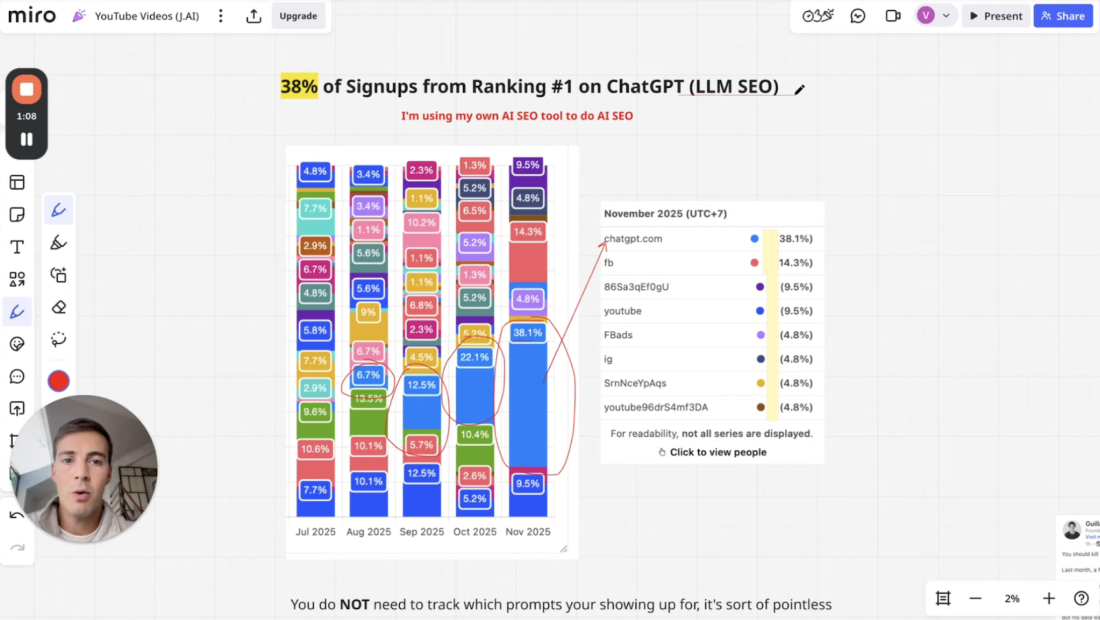LLM SEO Increased Arvow’s ChatGPT Leads by 38%

Between August and November, Arvow - the AI SEO platform that helps websites rank on Google and be cited on ChatGPT - saw an astonishing shift in where its leads were coming from.
By implementing a strategy we call LLM SEO, we increased the share of signups coming directly from ChatGPT mentions from 6.7% in August to 38.1% in November - a 5.6× growth in three months.
This case study breaks down how we did it, how we tracked it, and why it matters for the future of search and lead generation.
The Results
The data was clear:
Month | Share of Signups from ChatGPT |
|---|---|
August | 6.7% |
September | ~13% |
October | ~26% |
November (to date) | 38.1% |
That means over one-third of all new users who joined Arvow in November came directly from a ChatGPT recommendation or citation.
And these aren’t casual clicks - they’re signups. People who discovered Arvow through a ChatGPT answer, visited the site, and created an account.
The Context
For most SaaS companies, SEO traditionally means ranking high on Google.
But over the past year, a new source of discovery has emerged: Large Language Models (LLMs) - like ChatGPT, Claude, Perplexity, and Grok.
When users ask LLMs for recommendations (“What’s the best AI SEO tool?”), the models often cite or link directly to specific brands or resources.
At Arvow, we started noticing this shift early. So we began tracking and optimizing for these AI citations - what we now call LLM SEO.
The Challenge
We wanted to know:
How many leads were actually coming from ChatGPT?
How do we measure something that happens inside a closed system like OpenAI?
And, more importantly, how can we influence those mentions?
Traditional analytics don’t show “AI sources” - so we had to get creative.
The Approach: Tracking ChatGPT Leads
To quantify this new traffic source, we used PostHog to track UTM-tagged links.
When ChatGPT references a website, its links usually include a parameter like:
?utm_source=chatgpt
That means if someone clicks that link, the destination website can detect that the visitor came from ChatGPT.
We aggregated all these UTM-tagged signups over time, visualized them inside PostHog, and compared them to total signups from other channels like YouTube, paid ads, and Instagram.
Lessons Learned
💡 1. Mentions in LLMs are a by-product of real SEO and brand work
There’s no “hack” to force ChatGPT to recommend you.
Instead, it rewards authoritative, trustworthy, and semantically rich content — the same principles behind classic SEO.
That means if your brand already ranks well on Google, publishes quality content, earns backlinks, and builds topical authority, you’ll naturally start being cited by LLMs too.
💡 2. Tracking prompts is pointless (for now)
OpenAI doesn’t share which prompts generated citations, and prompt-tracking tools are still unreliable.
The focus shouldn’t be on micro-analyzing prompts but on increasing the likelihood your brand is the “best possible answer.”
💡 3. Don’t get lost in data
Analytics are important, but many founders obsess over dashboards while ignoring what actually moves the needle.
As one viral post we shared put it:
“Data is where startups go to avoid hard decisions.”
LLM SEO success comes from execution, not perfect tracking.
What Actually Drove the Mentions
While LLM SEO is still an emerging field, our top-performing initiatives included:
Publishing high-authority topical clusters around AI SEO, internal linking, and content automation.
Getting cited by other trusted sources (via guest posts, partnerships, and backlinks).
Improving our brand’s knowledge graph presence, so LLMs can more easily associate “Arvow” with “AI SEO tool.”
Maintaining clear metadata and schema markup across all content.
Encouraging branded search - people prompting ChatGPT with our name (“Arvow AI SEO”) trains the model over time.
Key Takeaway
“There are very few things you can do to impact LLM rankings that don’t also impact your brand and Google rankings.”
— Vasco, Founder of Arvow
In other words, LLM SEO isn’t a separate playbook - it’s an evolution of SEO.
Your citations in ChatGPT are the by-product of doing traditional SEO exceptionally well.
Next Steps for Founders
If you want to start ranking on ChatGPT and capturing LLM traffic:
Master the fundamentals - high-authority content, backlinks, brand trust.
Track ChatGPT leads using utm_source=chatgpt in your analytics.
Optimize your site structure and schema so models can parse and cite your data.
Watch the free LLM SEO course - a 1-hour training that shows exactly how we applied these principles to Arvow.
Watch the Free LLM SEO Course (Rank on ChatGPT in 90 Days) below:
Final Thoughts
38% of our signups now come from ChatGPT - and that number continues to grow every month.
The future of SEO isn’t just about ranking on Google.
It’s about being cited by the AI that people trust to make their decisions.
That’s what LLM SEO is all about - and why we believe it’s the next big traffic channel for every brand that wants to stay ahead.

Generate, publish, syndicate and update articles automatically
The AI SEO Writer that Auto-Publishes to your Blog
-
Articles in 30 secs
-
No credit card
-
Join 25,260+ businesses